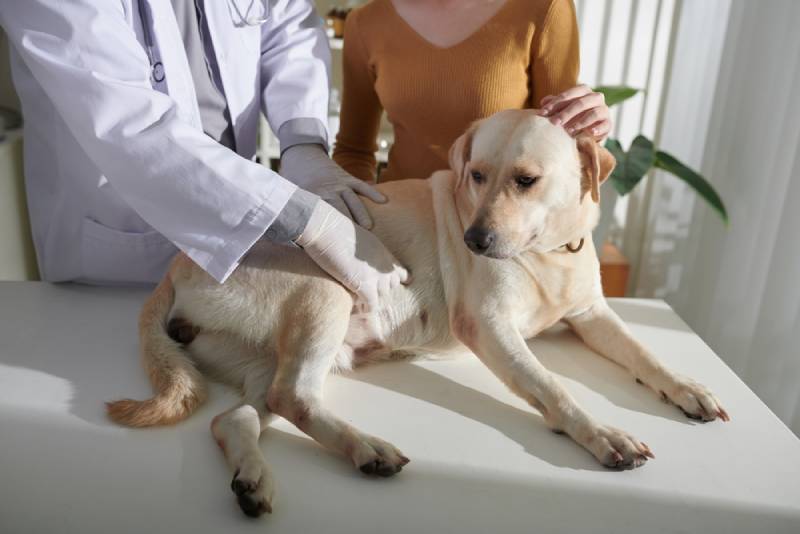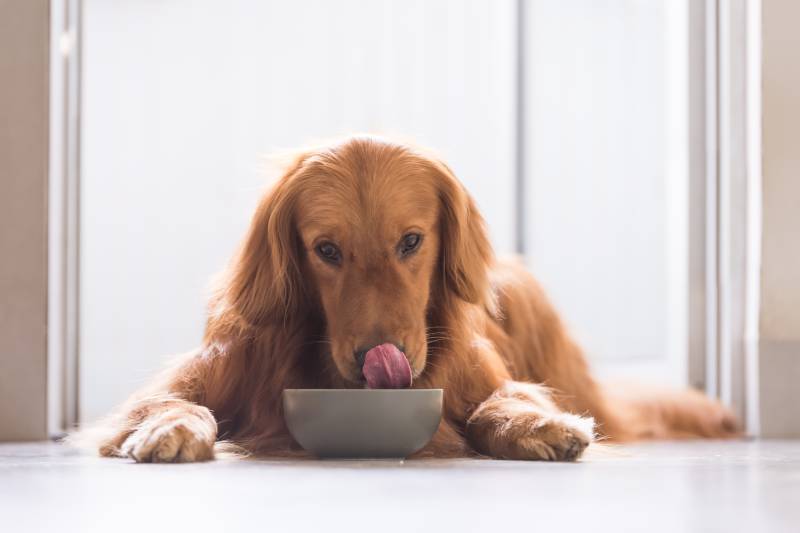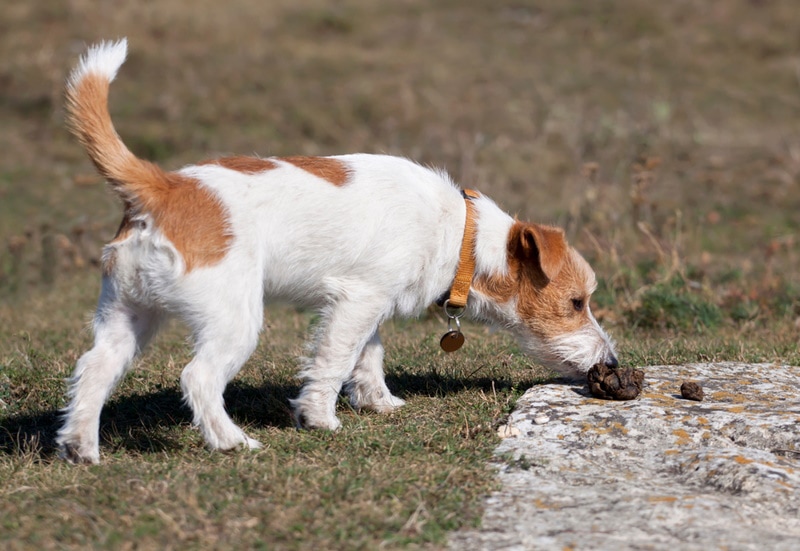Colitis in Dogs: Causes, Signs & Treatments (Vet Answer)
Updated on

Click to Skip Ahead
Diarrhea is a common problem in dogs. Some dogs will eat anything—compost from the garden, rotting fish on the beach, a slice of bacon dropped on the floor… the list goes on. Ingestion of something unusual can cause diarrhea in dogs. But what about colitis? Is it different from diarrhea, and is it more concerning?
Colitis is a cause, while diarrhea may be the effect. Colitis refers to inflammation of the colon, or large intestines, which often results in diarrhea. There are numerous causes of colitis in dogs, ranging from bacterial infections to foreign body inflammation. This article will explain colitis in dogs in more detail, hopefully answering the questions you’ve likely been left wondering about.
What is Colitis in Dogs?
Colitis simply refers to inflammation of the colon. The colon is also known as the large intestine. Think of the digestive tract as a system of different passages starting with the esophagus, which transports food to the stomach; from the stomach, it passes into the small intestine, which leads to the colon or large intestine. The colon then leads to rectum and then the anus where it exits from the body.
When the colon becomes inflamed, the result is often diarrhea. The colon is responsible for further digesting food and absorbing nutrients and water; if the lining of the colon becomes inflamed, absorption is impaired, meaning fluid and nutrients become lost in stools.

What Are the Signs of Colitis in Dogs?
As we have mentioned, colitis typically results in diarrhea. However, diarrhea caused by colitis has certain characteristics that distinguish it from other causes of diarrhea.
- Soft stools (but usually not liquid)
- Frequent defecation
- Stools are smaller in volume
- Straining to defecate
- Fresh blood on or in stool
- Mucous lining on the stool
- Reduced appetite
- Lethargy
- Possibly abdominal pain
This differs from diarrhea caused by small bowel inflammation, which tends to be less frequent, but more liquidy and voluminous.
What Are the Causes of Colitis in Dogs?
There are numerous causes of colitis in dogs. This is because many different health issues can cause the colon to become inflamed. Five common causes have been outlined below:
- Stress colitis. This sounds a bit strange, but stress, whether due to lifestyle factors or illness elsewhere in the body, seems to be a common cause of diarrhea.
- Salmonella and Clostridia, which can be picked up in rotten food or soil, can cause colitis in dogs. Parasites such as Giardia and intestinal worms can also cause colitis.
- Dietary indiscretion. This occurs when dogs have eaten something strange, or something very unusual to their normal diet, which causes an inflammatory response in the intestinal tract. Vomiting may also occur. Eating non-digestible items that lead to foreign objects in the digestive tract is also a cause.
- Diet. Sudden changes to a dog’s diet or food allergies or sensitivities can also lead to inflammation of the colon. Dogs with food allergies/sensitivities may also show vomiting, weight loss, and skin issues.
- Inflammatory bowel disease, some types of cancer, an upset in the microbiome, or unknown causes may also result in colitis and diarrhea.
How Do I Care for a Dog with Colitis?
Caring for a dog with colitis should start with a visit to the veterinarian. Colitis varies in severity. Some dogs will only have mild signs, while still eating and appearing happy. In this case, outpatient management may be possible at home. Vets may dispense probiotics, electrolytes, and a bland diet such as cooked chicken and white rice, while things “settle down” in your dog’s digestive system. If this is the case, you should expect a resolution in a few days.
Other dogs—particularly those suffering from severe diarrhea—can become more unwell. Due to dehydration and pain, it may be best for these dogs to be admitted to a veterinary hospital. Here, common treatments include fluids, pain relief, anti-nausea medications, and antibiotics.
If inflammatory bowel disease is either suspected or diagnosed, treatment with prescription diets and immunosuppressive medications may be warranted. Food allergies/sensitivities may require an elimination diet, infections may require antibiotics, and parasites will require medications.

Frequently Asked Questions
What is the Prognosis for Dogs with Colitis?
Thankfully, the prognosis for dogs with colitis is very good. The vast majority of dogs make a complete recovery, though the timeline in which this occurs depends on the cause and severity of signs.
Is Colitis Contagious to Other Dogs?
Colitis caused by infection can be contagious to other dogs. Bacteria, worms, and Giardia can all be “picked up” by dogs that come into contact with the feces of affected dogs. Other causes, such as stress colitis, food sensitivities, and inflammatory bowel disease, are not contagious.

How is Colitis Diagnosed in Dogs?
Colitis may be suspected based on a thorough history and physical examination performed by your veterinarian. However, identifying the specific cause of colitis often requires further diagnostic testing. This may involve blood and fecal tests, X-rays and ultrasound, and sometimes a biopsy of colon tissue. Thankfully, the majority of cases of colitis do not require this rigorous testing, as the problem can be fixed with supportive care, bland food, and time.
Conclusion
Frequent small amounts of diarrhea with fresh blood and mucus are the classic signs of colitis in dogs. While diarrhea is a common issue in dogs, colitis is just one of the many causes. Sometimes, further testing is required to explain why colitis is occurring. And, sometimes, intensive treatment will be required to ensure your dog makes the fastest possible recovery.
Thankfully, colitis in dogs can usually be successfully treated. If your dog is showing signs of colitis, a prompt visit to your veterinarian is certainly a good idea.
Featured Image Credit: Dragon Images, Shutterstock














